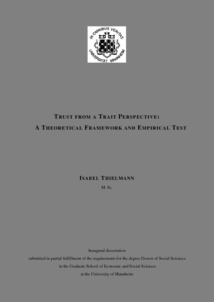|
Trust from a trait perspective: a theoretical framework and empirical test
Thielmann, Isabel
![[img]](https://madoc.bib.uni-mannheim.de/style/images/fileicons/application_pdf.png)  Vorschau |
|
PDF (Dissertation Thielmann)
diss_final_print_081215.pdf
- Angenommene Version
Download (1MB)
|
|
URL:
|
https://madoc.bib.uni-mannheim.de/39945
|
|
URN:
|
urn:nbn:de:bsz:180-madoc-399456
|
|
Dokumenttyp:
|
Dissertation
|
|
Erscheinungsjahr:
|
2015
|
|
Ort der Veröffentlichung:
|
Mannheim
|
|
Hochschule:
|
Universität Mannheim
|
|
Gutachter:
|
Erdfelder, Edgar
|
|
Datum der mündl. Prüfung:
|
8 Dezember 2015
|
|
Sprache der Veröffentlichung:
|
Englisch
|
|
Einrichtung:
|
Außerfakultäre Einrichtungen > GESS - CDSS (SOWI)
Fakultät für Sozialwissenschaften > Kognitive Psychologie u. Differentielle Psychologie (Erdfelder 2002-2019)
|
|
Fachgebiet:
|
150 Psychologie
|
|
Normierte Schlagwörter (SWD):
|
Vertrauen , Persönlichkeit , Vertrauenswürdigkeit , Ehrlichkeit
|
|
Freie Schlagwörter (Englisch):
|
trust , personality , person-situation-interaction , social projection , trustworthiness , Honesty-Humility
|
|
Abstract:
|
Corresponding to the pivotal role of trust for all kinds of social interactions and inter-personal relationships, trust has been the target of abundant research across scientific disci-plines. However, an integration of the huge literature is currently missing – thus hampering a common understanding of trust and a synthesis between the fields. Furthermore, from a psy-chological perspective, there is an insufficient understanding of the (basic) personality traits accounting for individual variation in trust. Therefore, the overall objective of this thesis is to bridge the gap between different lines of trust research and to uncover the dispositional de-terminants of trust. To that end, a behavioral view on trust is adopted, defining trust in terms of a risky choice to depend on another. Based on a broad review of the literature, a theoretical framework is distilled, identifying the situational features and personality characteristics un-derlying trust. Specifically, trust is considered to be a function of (1) attitudes toward risky prospects (risk and loss aversion), (2) trustworthiness expectations, and (3) betrayal sensitivity. These determinants are, in turn, rooted in different traits (i.e., anxiety/fear, trustworthiness, and forgiveness) which can be localized in the space defined by basic personality models. Here, the HEXACO model provides particularly clear-cut hypotheses on the basic traits driv-ing trust, including a unique factor for each of the proposed (specific) trait determinants.
Building on this reasoning, the empirical part of this thesis presents first evidence on the link between the HEXACO dimensions and trust. As a starting point, the focus was on the Honesty-Humility factor, representing the unique feature of the HEXACO model compared to more established models of personality (e.g., the Five-Factor Model). In line with the pro-posed theoretical framework, two sets of studies provided support for a social projection path from trait trustworthiness to trustworthiness expectations. Specifically, high levels of Hones-ty-Humility predicted more optimistic trustworthiness expectations and – as necessitated by social projection – were also positively linked to trustworthy behavior. As such, the findings not only identify a trait source of trust, but also clarify the dispositional determinants of trust-worthiness. Overall, the theoretical framework and empirical evidence presented in this thesis suggests the fruitfulness to take a closer look at trust – from a trait perspective.
|
 | Dieser Eintrag ist Teil der Universitätsbibliographie. |
 | Das Dokument wird vom Publikationsserver der Universitätsbibliothek Mannheim bereitgestellt. |
 Suche Autoren in Suche Autoren in
Sie haben einen Fehler gefunden? Teilen Sie uns Ihren Korrekturwunsch bitte hier mit: E-Mail
Actions (login required)
 |
Eintrag anzeigen |
|
